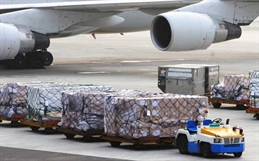
Freight forwarders warn of an air cargo capacity crunch from key Asian markets during the peak season due to new product launches and e-commerce demand.
Taiwan-based company Dimerco said that this year's increase in e-commerce demand has created additional pressure on capacity, as online marketplaces have directly signed deals with commercial airlines, reducing the availability of commercial flight capacity, particularly between China and the US.
Spot rates, for instance, have also already surged to US$9-US$10 per kg.
"Another product category that will contribute to the capacity demand is the consumer electronics market, which will begin its peak season in September," the freight forwarder noted.
For instance, Dimerco pointed out that Apple shifting its manufacturing back to China for iPhone 16, along with other new launches — which will start hitting the market in September — will further add pressure to both capacity and demand for the route.
The growing multisourcing strategy is also increasing pressure on air cargo capacity from Southeast Asia.
"As more production of finished goods has relocated from China to Southeast Asia since 2022, additional capacity is required to transport these products to the US and Europe," the freight forwarder said, adding that this has put significant pressure on freighter services in key transit hubs like Taiwan, Korea, Japan, and Hong Kong.
This is impacting outbound capacity from these locations as well.
Dimerco also noted cargo buildup out of Ho Chi Minh and Hanoi in Vietnam, Singapore and Manila in the Philippines, further putting pressure on the already expected capacity crunch.
Meanwhile, UK forwarder Metro also said air cargo is "under pressure" as peak season looms.
"With capacity already strained and further challenges expected from potential labour strikes and reduced belly capacity in the final quarter, shippers are under increasing pressure to secure cargo space ahead of the peak season," it noted.
Citing data from the International Air Transport Association (IATA), the forwarder explained that global air cargo demand surged by 14% year-on-year in July, marking the eighth consecutive month of double-digit growth, but capacity only grew by 8%, pushing load factors up significantly and intensifying the pressure on available space.
Metro said this increase is largely driven by ongoing e-commerce expansion and disruptions such as the Red Sea crisis.
"With the peak shipping season starting in September, air cargo demand is expected to remain robust, particularly in high-demand regions like Asia Pacific. However, capacity constraints are already evident, with flights on many lanes fully booked," Metro said.
"The market faces potential additional pressure from reduced belly capacity in Q4 and the possibility of strikes at US East Coast ports, which could exacerbate the existing challenges," it added, noting that the Red Sea shipping crisis had seen some volumes move from sea to air.
"The ongoing Red Sea crisis has disrupted traditional shipping routes, leading to a shift towards air freight as shippers seek more reliable alternatives. This shift, combined with the seasonal reduction of capacity on other lanes, has left the market vulnerable to further disruptions, potentially causing backlogs and price spikes."
"As carriers redirect freighter capacity to the high-demand Asia market and reduce capacity on other routes, the market’s fragility increases. The anticipation of a strong peak season, coupled with the current tight capacity, means that shippers must act quickly to secure space and avoid significant disruptions," the forwarder added.
Metro urged shippers to plan early for the peak season.
"Given the current market conditions, shippers are strongly advised to plan ahead and secure air freight space as soon as possible. The combination of high demand, potential capacity shortages, and the risk of labour disruptions could lead to an overheated market towards the end of the year, with rates likely to continue rising," it said.



